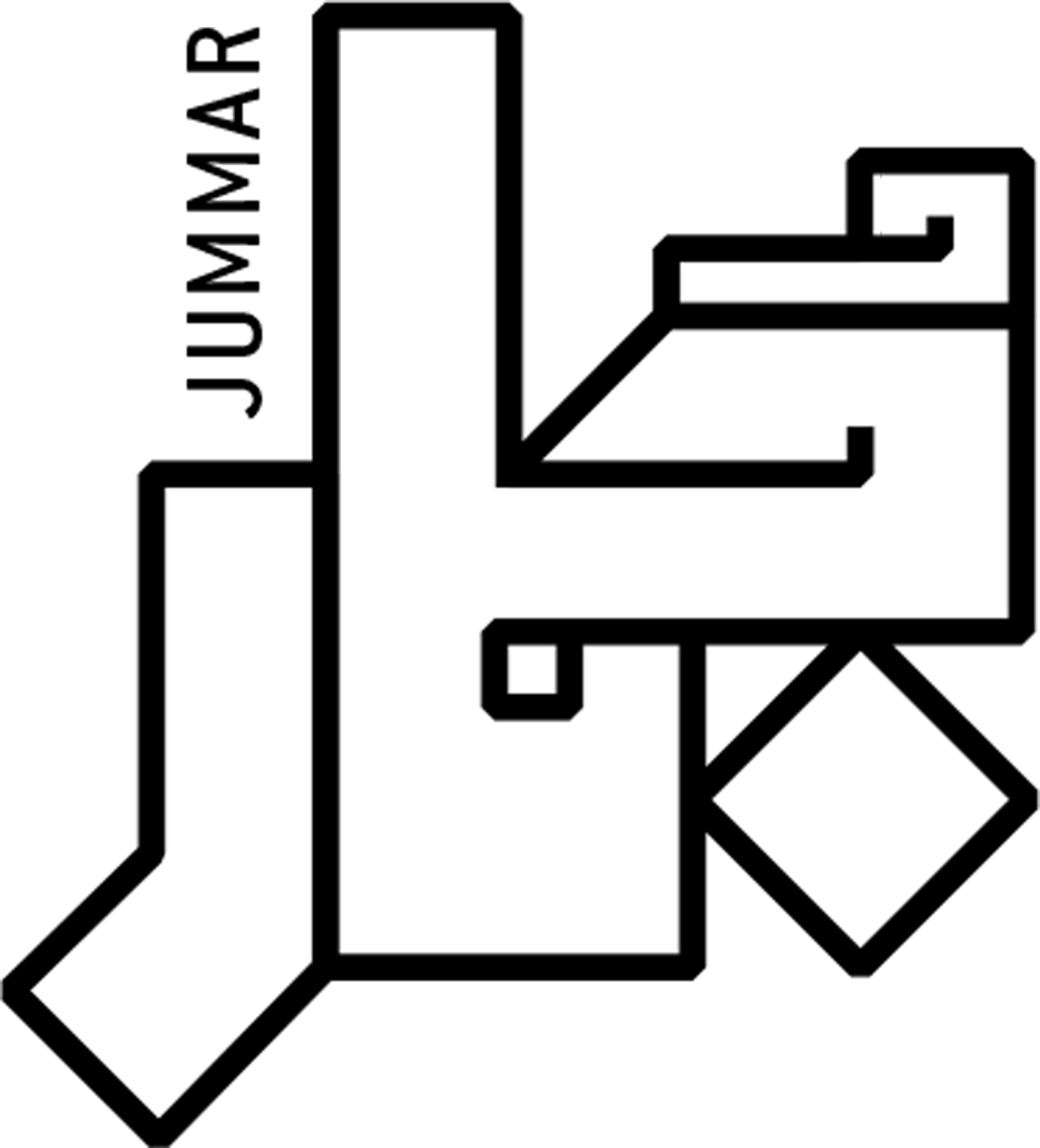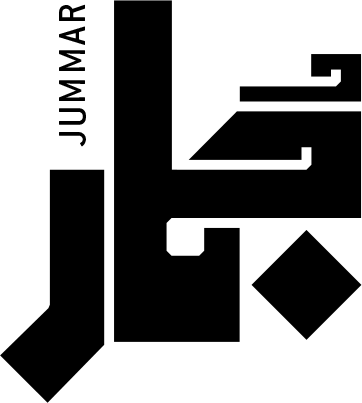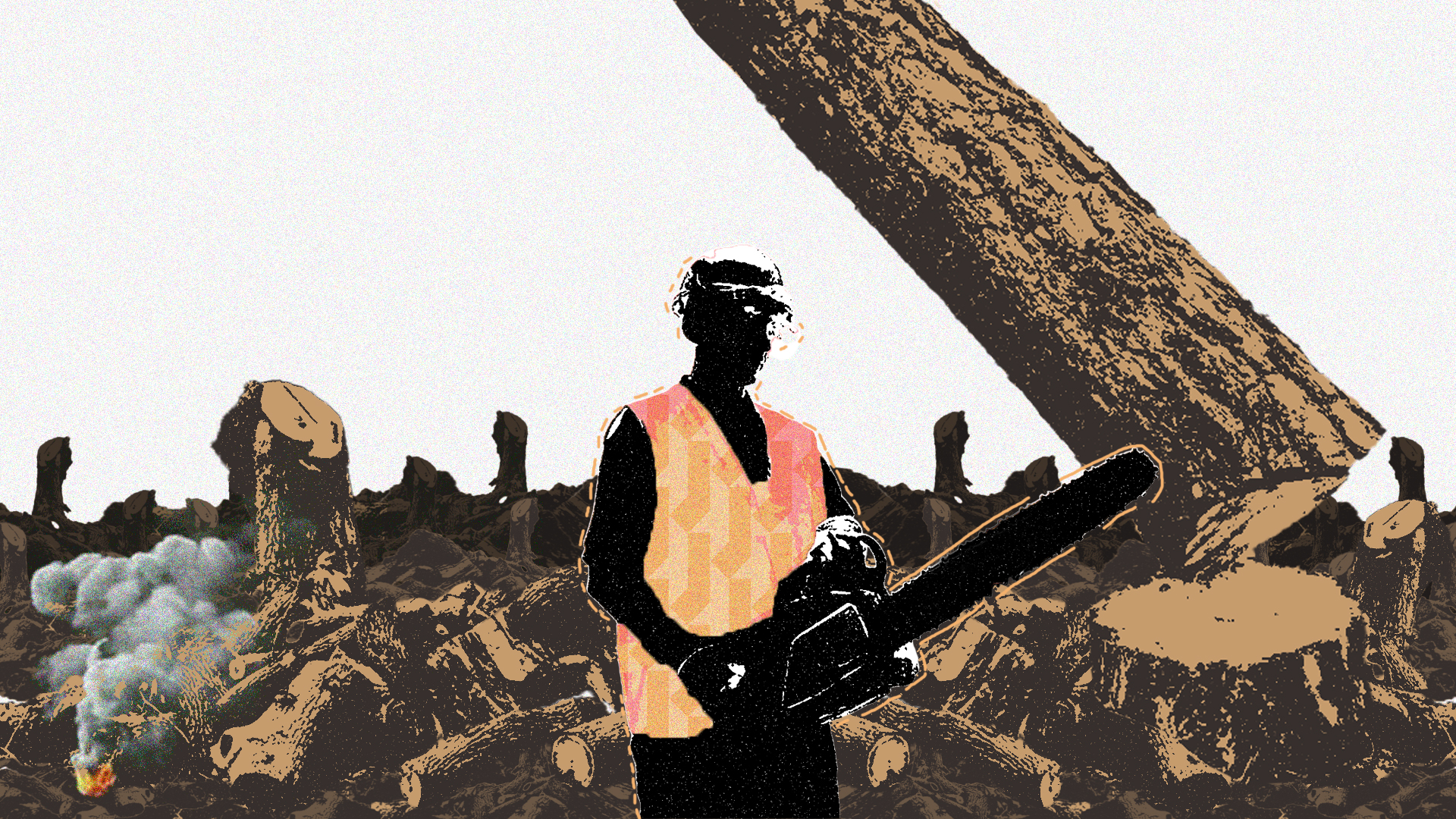Livelihoods are turning forests into deserts: Sardar cuts Kirkuk’s trees while Khurshid turns them into coal
23 Oct 2022
Sardar Gharib does not regret cutting down thousands of trees. “This is the source of my livelihood and support for my two children. It is the livelihood of dozens of unemployed people” he says as he thinks about using his saw to clear a new forest.
The livelihoods of Sardar Gharib and Abdullah Zeidan Khurshid depend on the profession of logging. Logging is causing desertification and is destructive to the environment. Although they may face imprisonment, neither is deterred from their profession.
Sardar Gharib, 30, packs his equipment, puts it in a large truck, and sets out every morning with his colleagues to the forests on the outskirts of Kirkuk Governorate. When they leave, everything changes. Sardar and his companions are loggers who sell wood to charcoal factories, an illegal activity using high-speed electric saws. They place the serrated head on the tree stem and press the plunger to make the tree fall as the saw head comes out the other side. To make transportation easier, the stems are cut into small pieces and loaded into two-ton cars. Since they chose this work 4 years ago, Sardar and his team of 14 people have cut down nearly 3,000 trees from forests on the banks of the Zab River – a tributary to the Tigris – which divides the Altun Kobri district in Kirkuk and extends to the neighboring Salah al-Din Governorate.
Not far from the forest sites, Abdullah Zaidan Khurshid, 28, is waiting for the wood that Sardar Gharib and his workers bring him every day. He buys a ton for approximately $100. Abdullah owns charcoal-making kilns that he inherited from his ancestors, which are underground pits with an iron cover and a handle. He and his workers throw wood inside these pits, light a fire, close the nozzle, returning two days later to open it, waiting for the smoke to come out before pulling the coals out by car to put it next to the pits. These kilns burn daily quantities of wood which range from 1 to 3 tons. Some workers suffer from respiratory diseases which are caused by the nature of their work.
Abdullah sells his black product to restaurants in Kirkuk and exports large quantities to Baghdad packed in nylon bags where buyers use them for barbecues.
Quality charcoal aggravates desertification
According to a member of the Kirkuk Agricultural Associations, Saadoun Yasser, the quality and aroma of the trees planted in the Kirkuk forests plus their dense numbers are attracting charcoal and timber traders. He told Jummar that the charcoal from these trees is of better quality than Turkish, Russian and Ukrainian charcoal of which Iraq imports more than 250 thousand tons annually.
The forest area in Kirkuk is 25 thousand acres according to official figures. It is located on the border between Kirkuk and Erbil and begins specifically in the Altun Kobri district, 40 km north of Kirkuk, and passes through the Dibs district and Al-Zab district in Hawija. Sadly, the area has been reduced by successive fires, the last of which erupted in June 2022 in Altun Kobri, destroying 25 acres according to the Agriculture Directorate.
Zaki Karim, a water resources official in Kirkuk, and Faridoun Zangana, director of the municipality in Kirkuk, commented on the work done by Sardar Gharib and Abdullah Khurshid, saying that these activities have damaged the environment and increased desertification. Desertification has increased to high levels over the past few years following a great water shortage as well as due to the felling of trees and their subsequent diminishing numbers.
The effects of logging are compounded by Iraq’s recent loss of half of its water imports. This is a result of upstream countries, namely Turkey and Iran, building dams on rivers and impounding water within their lands, which has reduced Iraq’s cultivated areas by half. Until a few years ago, farmers worked on 1.25 million acres in Kirkuk farming a variety of crops. The authorities have since forced them to reduce the area to 500 acres due to the scarcity of water.
Hillo Ghazi, head of the local Dibs organization, a Kirkuk-based organisation working on the protection of the environment, showed us photos of firefighters, with reinforcements from stations across Iraq, putting out fires raging in the Altun Kobri forests two months ago. Some fires break out in forests which the municipality gave to investors to build nurseries on. No one yet knows the source of those fires but Ghazi suspects that they are coal and timber merchants. For him, their encroachment into forests represents an “environmental disaster… these forests are nature reserves that repel dust storms and reduce desertification.” Government officials Zaki Karim and Faridoun Zangana agree with him.
In recent months, dust storms have recurred, with an average of one storm per week covering most Iraqi cities. This sees thousands of Iraqis in hospital, with some killed by suffocation according to the Ministry of Health. The Ministry of Environment in Iraq expects 300 dust storms a year in the future. While the central government in Baghdad is taking steps to combat desertification through afforestation – tree planting and seeding – it is encountering several obstacles, most notably the lack of water.
Tree-cutters are criminals
The director of the municipality in Kirkuk, Faridoun Zangana, said that his department had allocated funds to increase green spaces and has launched a campaign for afforestation. The Kirkuk administration has also set a condition that, for every student who is accepted and then graduates from university, a tree must be planted. The Department of Agriculture is working to increase the available areas for farming, according to its director, Zuhair Ali.
The director of the municipality describes the loggers from the forests as criminals, while the police set ambushes, arrest them, confiscate their wood, cars and saws, imprison and prosecute them. The deputy police chief of Kirkuk, Major General Ali Mutashar al-Obeidi, recounted the details of one of these pursuits: “We received information about a case of trees being cut down, and a few days later we received information about the movements of a group of loggers.” In the pursuit of those who chop timber, the police rely on the Forests and Woodlands law, enacted by Parliament in 2009, which stipulates a fine of 50,000 IQ dinars plus the confiscation of tools for anyone who cuts a tree from state and public sector forests, and a fine of 25,000 IQ dinars if the forests are private. Al-Obeidi spoke about issuing strict instructions to arrest those who cut down or transport trees and stressed the need for new laws that enable the police to protect the environment.
Sardar Gharib does not regret the felling of thousands of trees. “This is the source of my livelihood and support for my two children. It is the livelihood of dozens of unemployed people” he says as he thinks about using his saw to clear a new forest.
Read More

“His gaze was intrusive; it pierced my soul”: On the Struggles of Divorced Women in Navigating Courts and Governmental Institutions
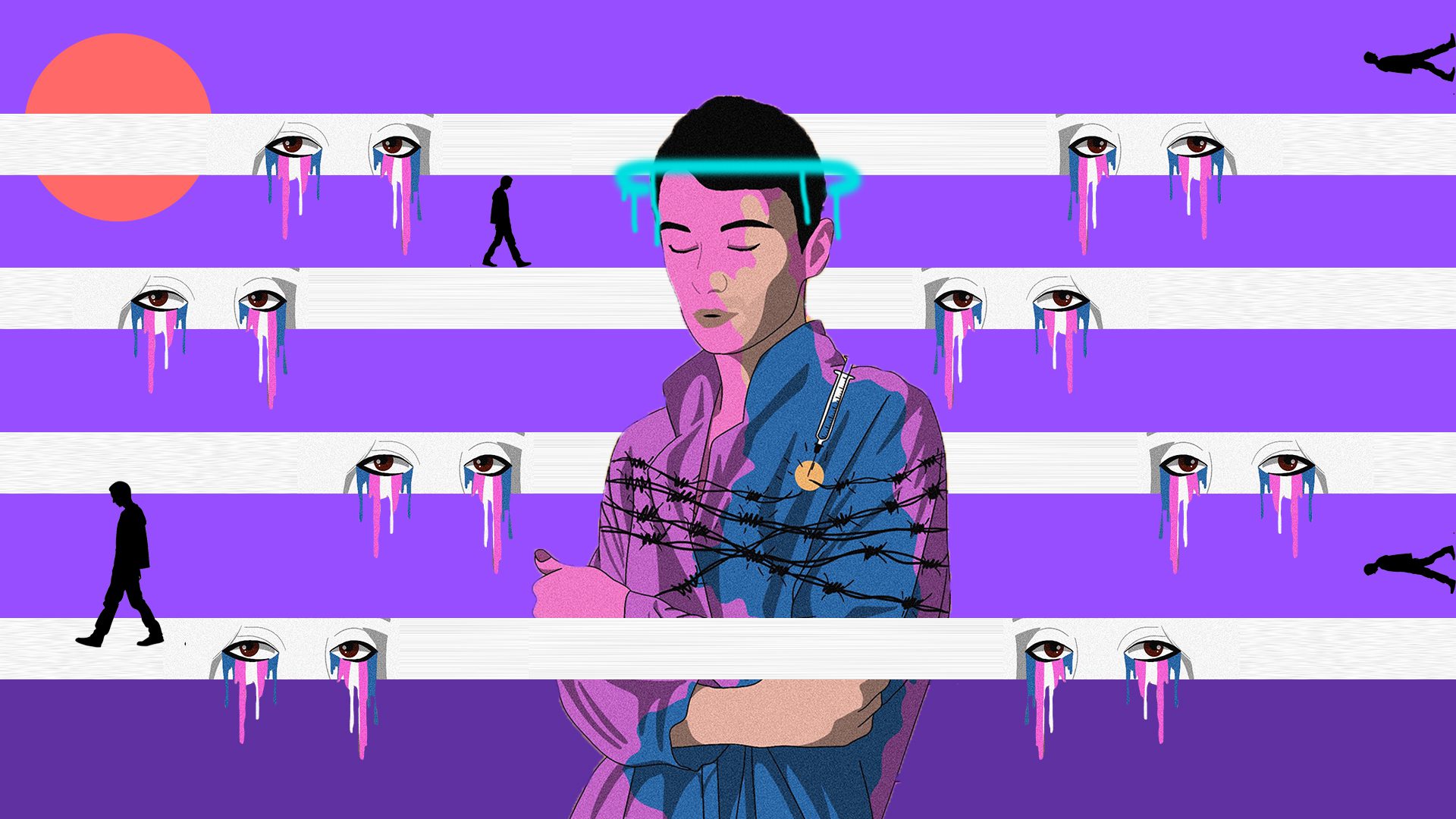
“She Brought a Fatwa from Khamenei and Al-Azhar, But It Went Nowhere”: The Struggles of Trans People in the Iraqi Health Sector
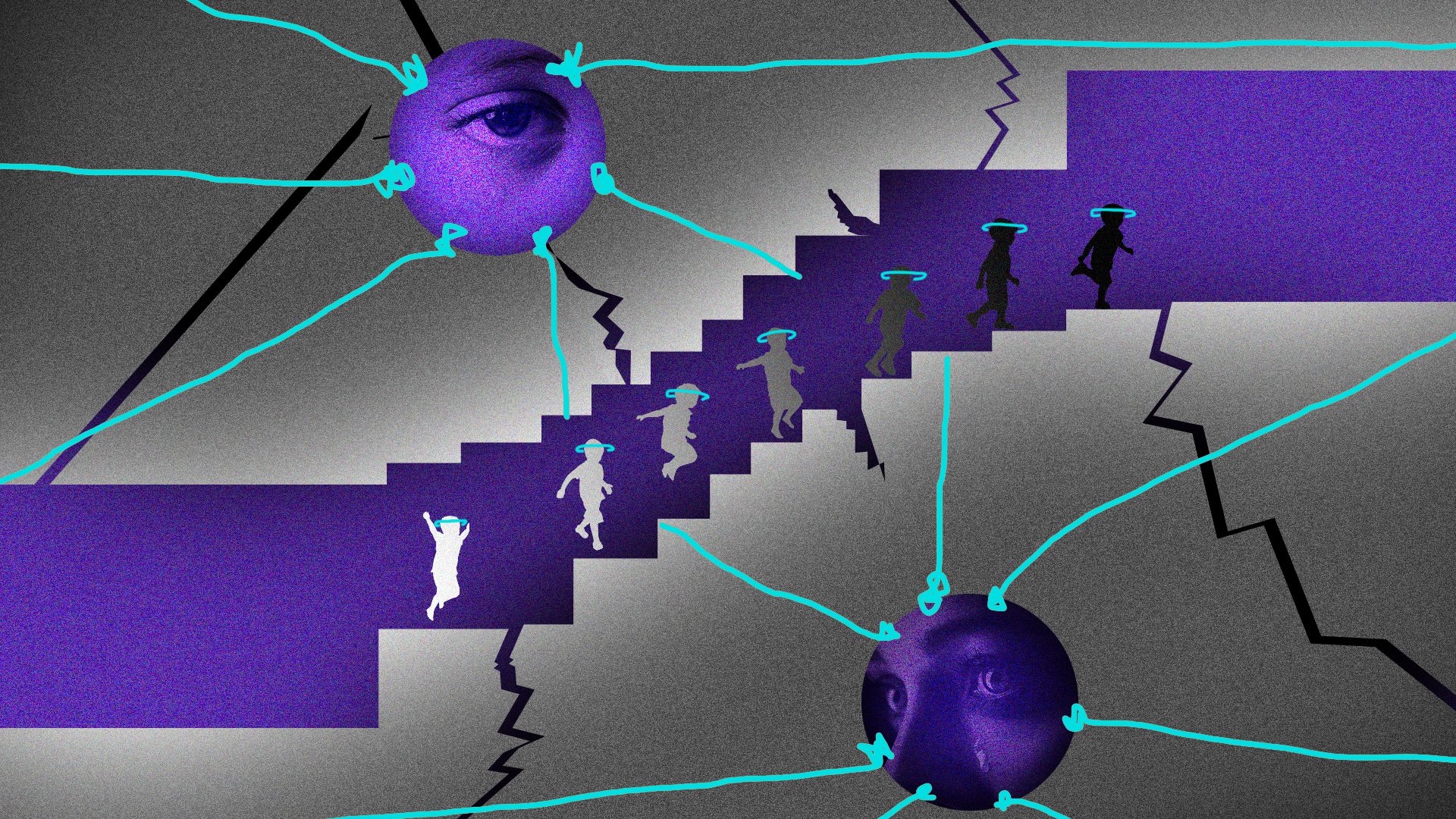
“Everyone has a Right to the Kids Except their Mother”: On Women Fighting for the Custody of Their Children

Iraqi Prisoners Blackmailed to Pay To Obtain Release Papers After Completing Their Sentence
The livelihoods of Sardar Gharib and Abdullah Zeidan Khurshid depend on the profession of logging. Logging is causing desertification and is destructive to the environment. Although they may face imprisonment, neither is deterred from their profession.
Sardar Gharib, 30, packs his equipment, puts it in a large truck, and sets out every morning with his colleagues to the forests on the outskirts of Kirkuk Governorate. When they leave, everything changes. Sardar and his companions are loggers who sell wood to charcoal factories, an illegal activity using high-speed electric saws. They place the serrated head on the tree stem and press the plunger to make the tree fall as the saw head comes out the other side. To make transportation easier, the stems are cut into small pieces and loaded into two-ton cars. Since they chose this work 4 years ago, Sardar and his team of 14 people have cut down nearly 3,000 trees from forests on the banks of the Zab River – a tributary to the Tigris – which divides the Altun Kobri district in Kirkuk and extends to the neighboring Salah al-Din Governorate.
Not far from the forest sites, Abdullah Zaidan Khurshid, 28, is waiting for the wood that Sardar Gharib and his workers bring him every day. He buys a ton for approximately $100. Abdullah owns charcoal-making kilns that he inherited from his ancestors, which are underground pits with an iron cover and a handle. He and his workers throw wood inside these pits, light a fire, close the nozzle, returning two days later to open it, waiting for the smoke to come out before pulling the coals out by car to put it next to the pits. These kilns burn daily quantities of wood which range from 1 to 3 tons. Some workers suffer from respiratory diseases which are caused by the nature of their work.
Abdullah sells his black product to restaurants in Kirkuk and exports large quantities to Baghdad packed in nylon bags where buyers use them for barbecues.
Quality charcoal aggravates desertification
According to a member of the Kirkuk Agricultural Associations, Saadoun Yasser, the quality and aroma of the trees planted in the Kirkuk forests plus their dense numbers are attracting charcoal and timber traders. He told Jummar that the charcoal from these trees is of better quality than Turkish, Russian and Ukrainian charcoal of which Iraq imports more than 250 thousand tons annually.
The forest area in Kirkuk is 25 thousand acres according to official figures. It is located on the border between Kirkuk and Erbil and begins specifically in the Altun Kobri district, 40 km north of Kirkuk, and passes through the Dibs district and Al-Zab district in Hawija. Sadly, the area has been reduced by successive fires, the last of which erupted in June 2022 in Altun Kobri, destroying 25 acres according to the Agriculture Directorate.
Zaki Karim, a water resources official in Kirkuk, and Faridoun Zangana, director of the municipality in Kirkuk, commented on the work done by Sardar Gharib and Abdullah Khurshid, saying that these activities have damaged the environment and increased desertification. Desertification has increased to high levels over the past few years following a great water shortage as well as due to the felling of trees and their subsequent diminishing numbers.
The effects of logging are compounded by Iraq’s recent loss of half of its water imports. This is a result of upstream countries, namely Turkey and Iran, building dams on rivers and impounding water within their lands, which has reduced Iraq’s cultivated areas by half. Until a few years ago, farmers worked on 1.25 million acres in Kirkuk farming a variety of crops. The authorities have since forced them to reduce the area to 500 acres due to the scarcity of water.
Hillo Ghazi, head of the local Dibs organization, a Kirkuk-based organisation working on the protection of the environment, showed us photos of firefighters, with reinforcements from stations across Iraq, putting out fires raging in the Altun Kobri forests two months ago. Some fires break out in forests which the municipality gave to investors to build nurseries on. No one yet knows the source of those fires but Ghazi suspects that they are coal and timber merchants. For him, their encroachment into forests represents an “environmental disaster… these forests are nature reserves that repel dust storms and reduce desertification.” Government officials Zaki Karim and Faridoun Zangana agree with him.
In recent months, dust storms have recurred, with an average of one storm per week covering most Iraqi cities. This sees thousands of Iraqis in hospital, with some killed by suffocation according to the Ministry of Health. The Ministry of Environment in Iraq expects 300 dust storms a year in the future. While the central government in Baghdad is taking steps to combat desertification through afforestation – tree planting and seeding – it is encountering several obstacles, most notably the lack of water.
Tree-cutters are criminals
The director of the municipality in Kirkuk, Faridoun Zangana, said that his department had allocated funds to increase green spaces and has launched a campaign for afforestation. The Kirkuk administration has also set a condition that, for every student who is accepted and then graduates from university, a tree must be planted. The Department of Agriculture is working to increase the available areas for farming, according to its director, Zuhair Ali.
The director of the municipality describes the loggers from the forests as criminals, while the police set ambushes, arrest them, confiscate their wood, cars and saws, imprison and prosecute them. The deputy police chief of Kirkuk, Major General Ali Mutashar al-Obeidi, recounted the details of one of these pursuits: “We received information about a case of trees being cut down, and a few days later we received information about the movements of a group of loggers.” In the pursuit of those who chop timber, the police rely on the Forests and Woodlands law, enacted by Parliament in 2009, which stipulates a fine of 50,000 IQ dinars plus the confiscation of tools for anyone who cuts a tree from state and public sector forests, and a fine of 25,000 IQ dinars if the forests are private. Al-Obeidi spoke about issuing strict instructions to arrest those who cut down or transport trees and stressed the need for new laws that enable the police to protect the environment.
Sardar Gharib does not regret the felling of thousands of trees. “This is the source of my livelihood and support for my two children. It is the livelihood of dozens of unemployed people” he says as he thinks about using his saw to clear a new forest.
